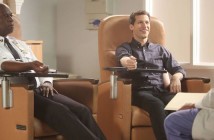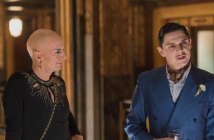November 28, 2015, 9:00 p.m. (EST), BBC
When this season began, I talked about “The Magician’s Apprentice” as “bad Moffat,” as an example of all of the ways the showrunner’s style could go wrong if tweaked in just the wrong way, to make an episode that is all spectacle and no import, engineered around meaningless reveals without much concern for any thematic undergirding. “Heaven Sent,” then, is nearly the opposite, a story that shows what Moffat can do when operating at the height of his powers. It’s a high concept episode with a puzzle box structure and a ready made twist (even if that twist is not all that hard to see coming), but it is more than that. All of those narrative pyrotechnics are in service of a story about The Doctor processing his grief and learning how to be that man that Clara always hoped he would be at the same time.
That twist, which finds The Doctor functionally killing himself and being reborn across billions of years while chipping away at a wall harder than diamond with just his fist, is structurally exactly what the episode was building to, and yet there is such a tragic horror to that final montage that it transcends the easy solution to the episode’s central mystery. It is not an easy thing to watch The Doctor die in agony again and again, and Capaldi’s weary determination sells the whole thing as very nearly the hell he ponders whether he has entered. Yet the episode is also canny about the fact that, while this is torture, it is not The Doctor’s hell, because there is a solution. The Doctor can get out of this prison, but only by refusing to give up, refusing to lose or to cede one inch in the face of endless torment.
It would be easy to sum the episode up by reference to that beautiful and horrifying final montage, or by the cliffhanger reveal (which we all guessed was coming before the season even began) that finds The Doctor back, at last, on Gallifrey, but that would be selling “Heaven Sent” short. Much press has been given to the episode’s existence as a one-hander, with only Capaldi speaking a word, and its clear early on that even the episode’s central creative forces—Moffat, Capaldi, and director Rachel Talalay—aren’t entirely sure the experiment is going to work. Capaldi looks terrified, and not simply because The Doctor is very very scared. There’s a sense that all involved knew this could go horribly wrong if they misthreaded the needle, but in all honesty, they shouldn’t have been that concerned.
People watch Doctor Who for The Doctor. They fall in love with a central performer who is so magnetic, so charming and enthralling, that they would follow him through all of space and time just to see what he might do next. The entire show is functionally built around the idea that what we want is more time with The Doctor. This is true of all television, really; sitcoms build casts of people audiences want to spend time with, and even the darkest drama is centered around characters compelling enough we want to come back to see what they are doing every week. But it is perhaps especially true of Doctor Who, which gains its spellbinding power from the fact that we always want more of its leading actor, even as we know no one stays in the part forever. This is where much of the emotional weight of companion departures (the good ones, anyway) are drawn from, and why even a mediocre regeneration story (like, say, “The End of Time”) can still hit us like a ton of bricks.
And, for the most part, this means we love The Doctor, whoever is playing the character. Everyone has favorites and least favorites, but part of the fun of this show is that I love nearly every Doctor in their own way (I am partial to the Eleventh, and not a huge fan of the Third and Fifth, but each has their moments). It is too early to say where Peter Capaldi will fall in my own personal ranking, much less in any cultural consensus about the quality of The Twelfth Doctor and his era of the show, but he is absolutely incredible in the role. I’ve danced around the over-used phrase for five paragraphs now, but “Heaven Sent” is a tour-de-force for the actor. He gets to be funny and sad, scary and scared, inspirational and devastating. We watch his heart break and we watch him march on anyway. This is a story that will likely go down as one of the classics of the Capaldi era, and in doing so will be lessened in some way, reduced to “The one that is just Capaldi in a castle.” This episode is more than its conceit in a way Doctor Who often struggles to be. There’s a weight to the proceedings here that completely respects the importance of Clara to The Doctor without feeling too maudlin, and while Moffat returns to this well again and again, he finds a new angle here on The Doctor as a character. I read the criticism a lot that Moffat fetishizes The Doctor and is too obsessed with the Time Lord navel-gazing his way across time and space, but watch “The Doctor Dances,” “The Girl in the Fireplace,” “The Eleventh Hour,” “Listen,” and “Heaven Sent,” and you will see arguably the most complex and multifaceted approach to this character in the entire history of the programme. Moffat has a lot to say about The Doctor, and in his best episodes, he says enough new things to blow me away.
Perhaps that’s why Moffat has been such a successful, though divisive, showrunner. He is perhaps the only writer in the history of Doctor Who to actually, consistently, write stories that are about The Doctor. The vast majority of Doctor Who stories are about other things entirely. The Doctor shows up to solve a problem and save some lives, and then he goes away again. The Doctor is either a mysterious figure or one the story doesn’t care about beyond the actions he takes there. In Classic Who, almost none of the characters really matter, and Russell T. Davies’ chief innovation was giving the companions real stories, arcs, and deeper characterization. It wasn’t until Steven Moffat that Doctor Who could really do stories about The Doctor without ceding the central mystery that shrouds the character. And while Moffat has maybe leaned too heavily on this innovation, he has opened up storytelling possibilities with it that the show has never touched before. He has found a new vein to mine, and it is one that has made Doctor Who all the richer as a result.
“Heaven Sent” is ultimately about the way The Doctor thinks, the way he approaches problems, and the way he is more irreducible than he imagines. Much of The Twelfth Doctor’s angst has been about whether he is a good man, whether he is as tied to more heroic versions of himself as he would like to think. But in “Heaven Sent” he draws a line in the sand and spends so much time defending it his stand dwarves The Eleventh Doctor’s vigil over Trenzalore. All of the sequences inside the TARDIS, where we just watch The Doctor working through problems, are thrilling for the way Moffat effortlessly captures the Time Lord’s genius, but they are more than that. They show the value of not just the companion generally, but of Clara specifically to the Twelfth Doctor. She’s always there with him, pushing him to be the best version of himself, pushing him to be better, imploring him to find the right solution, to save just one more life, to be the hero she saw in him. “Face the Raven” was an ode to Clara Oswald, but “Heaven Sent” is a beautiful eulogy, an episode that respects her memory and gives The Doctor billions of years to grieve her properly.
Going back to Gallifrey is always a risk. The Doctor’s home planet has been the setting for one of the best stories in the show’s history (“The Deadly Assassin”) and plenty of terrible ones (“Arc of Infinity,” “The Invasion of Time,”), but the planet presents more potential problems than it does upsides for a lot of reasons we may be discussing next week. Yet after “Heaven Sent,” it almost does not matter whether “Hell Bent” is an unmitigated disaster. This episode exists as such a beautiful pause between the tragedy of “Face the Raven” and the bombast I am sure awaits us in “Hell Bent” that it will continue to be a high water mark of the season even if the second part is a trainwreck. We’ll always have those billions of years in that castle, where the Doctor learns to be the man he is on his best days all over again.
The Roundup
- “As you come into this world, something else is also born.”
- “You will run. It will walk. You will rest. It will not. One day, you will linger in the same place too long. You will sit too still, or sleep too deep. And when, too late, you rise to go, you will notice a second shadow next to yours. Your life will then be over.”
- “I am the Doctor. I’m coming to find you. And I will never, ever stop.”
- “Clara said I shouldn’t take revenge. You should know, I don’t always listen.”
- “What are you, gardeners? I hate gardeners. What sort of person has a power complex about flowers? It’s dictatorship for inadequates. Or to put it another way, its dictatorship.”
- “I can’t actually see a way out of this. I’ve finally run out of corridor. There’s a life summed up.”
- “The first rule of being interrogated is that you are the only irreplaceable person in the torture chamber. The room is yours.”
- “Well, that was another close one! Or it will have been, once I’ve gone and got myself out of it. So how am I going to do that?”
- “It’s funny The day you lose someone isn’t the worst. At least you’ve got something to do. It’s all the days they stay dead.”
- “I’m not scared of Hell. It’s just Heaven for bad people.”
- “Can’t I just lose? Just this once?”
- “Doctor, you are not the only person who’s ever lost someone. That’s the story of everybody.”
- “Personally, I think that’s a hell of a bird.”
- “Tell them I came the long way round.”
“Heaven Sent” is ultimately about the way The Doctor thinks, the way he approaches problems, and the way he is more irreducible than he imagines.
-
AMAZING




